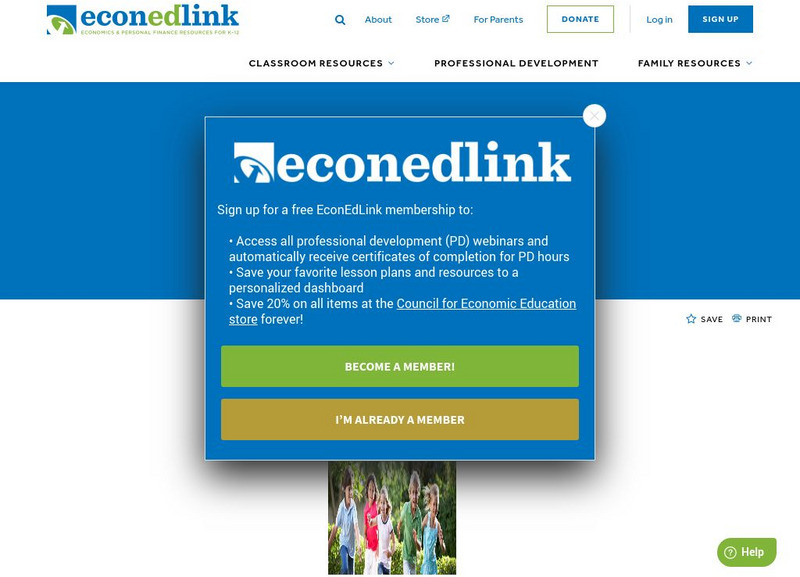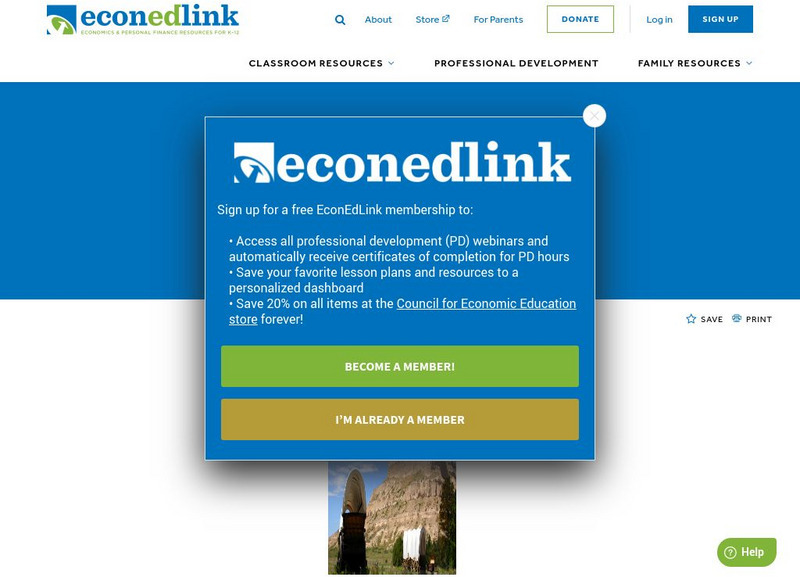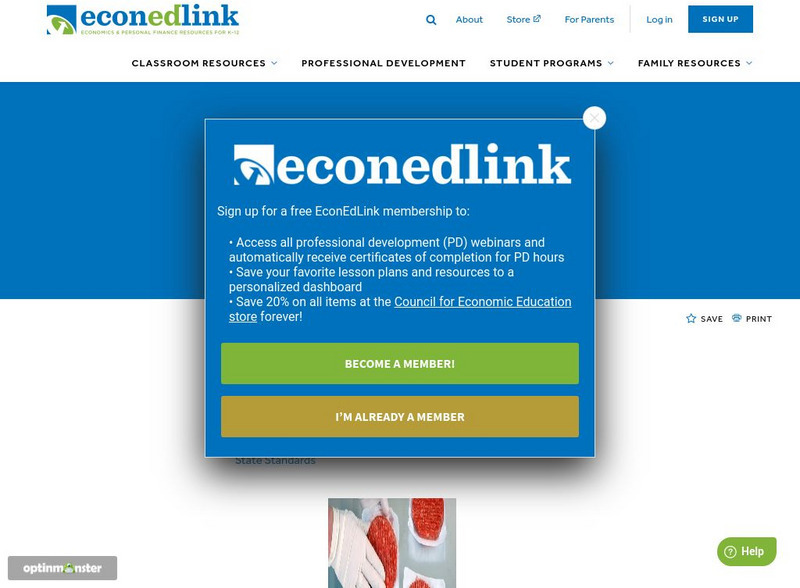Council for Economic Education
Econ Ed Link: What Are Incentives?
Students will understand that incentives are used to encourage them to make good choices. After identifying incentives offered at home and in school, the students will distinguish between positive and negative incentives.
Council for Economic Education
Econ Ed Link: The Best Deal
Students will learn how to determine 'price per unit' to help make decisions when comparing products.
Council for Economic Education
Econ Ed Link: Costs and Benefits of 'The Three Little Pigs'
Find out what the definition of a cost and a benefit is in terms of the economy when using this site. "When making a decision, young scholars should consider the costs and the benefits of that decision."
Council for Economic Education
Econ Ed Link: The Mystery of Is It Mine or Ours?
Students will learn that people respond predictably to positive incentives (rewards) and negative incentives (penalties). They will identify incentives in their daily lives at home and school. Students will discuss which incentives have...
Council for Economic Education
Econ Ed Link: Off to Interactive Island
This activity provides a fun way to explore concept of economic decision making. In the lesson, students are given a limited number of "tokens" and asked to exchange those tokens for goods in preparation for pioneering in a new land....
Council for Economic Education
Econ Ed Link: Off to Interactive Island
This site is a lesson that teaches students about scarcity and choice. Students participate in a simulation where they are asked to make choices about what they want to take with them in order to survive.
Council for Economic Education
Econ Ed Link: Dynamic Decision Making
Students will be introduced to the PACED Model and learn to use the parts of the model-- Problem, Alternatives, Criteria, and Evaluation- in solving problems and making decisions. They will practice using the model in decisions about...
Council for Economic Education
Econ Ed Link: A Penny Saved Is a Penny at 4.7% Earned
There are lots of ways to receive income, and lots of ways to spend it. In this EconomicsMinute you will develop two budgets to help you decide how to allocate your income. Assuming you do not love making dollar bill rings.
Council for Economic Education
Econ Ed Link: Pop Goes the Housing Bubble
In this lesson, young scholars will learn about a speculative bubble within the context of the U.S. real estate market.
Council for Economic Education
Econ Ed Link: There Is Something in the Water
The United States is losing 60,000 acres of wetlands each year. Is this good or bad? Does anyone really want to live in swamps, fens, bogs, and marshes? Or is it better economics to drain the wetlands for other purposes like agricultural...
Council for Economic Education
Econ Ed Link: Guess Who's Coming to Dinner
This lesson introduces regulation and information as two tools used by government to promote fair competition and complete information in a market economy. Using the 1906 Pure Food and Drugs Act as a case study, students explore the...
Council for Economic Education
Econ Ed Link: Be an Energy Saver
This activity focuses on the scarce and non-renewable nature of fossil fuels in order to stimulate student thinking about energy conservation. It emphasizes the fact that saving energy can be good for the wallet as well as the earth's...
Council for Economic Education
Econ Ed Link: Education: Weigh Your Options
Getting and keeping a job often requires special education or training. While an employer may provide or pay for some additional education or training, workers often have to obtain it on their own. In this instructional activity,...
Council for Economic Education
Econ Ed Link: Here's Your Chance to Make Millions in the Stock Market (Part 2)
In Part II of this lesson plan, young scholars will have the opportunity to complete an interactive exercise that will take them on a historical tour of the stock market from 1920 until just after WWII. Students will learn the difference...
Council for Economic Education
Econ Ed Link: Here's Your Chance to Make Millions in the Stock Market (Part 3)
In Part III of this lesson, students will have the opportunity to complete an interactive exercise that will take them on a historical tour of the stock market from Post WWII through the year 2001. Students will learn the difference...
Council for Economic Education
Econ Ed Link: It's a Matter of Power
Students examine tradeoffs and profit- maximization decisions in the case study of Kaiser Aluminum, which decided to shut down aluminum production in favor of reselling electricity.
Council for Economic Education
Econ Ed Link: The Collapse of Corporate Giants: The New Dr. Evils?
This lesson plan was inspired by an article in "Fortune" magazine, "Why Companies Fail," May 27, 2002. Its focus is on the relationship of business ethics to business bankruptcy or near failure. Students participate in a simulation by...
Council for Economic Education
Econ Ed Link: The Economics of Voting
Since the 1960s, many Americans eligible to vote have not bothered to do so- not even in presidential elections. Low rates of participation in voting have been worrisome to people interested in preserving our democratic traditions....
Council for Economic Education
Econ Ed Link: Understanding a Balance Sheet
A balance sheet shows the assets, liabilities, and net worth for a business on a given day. This business document is one of the major documents used in evaluating a business. Students will learn the components of a balance sheet by...
Council for Economic Education
Econ Ed Link: Utility
Can happiness be measured? Students will learn how utility relates to economic decision making and the law of diminishing marginal utility.
Other
Western Oregon University: Resistance Skills
Here is a list of some strategies that can be used to resist peer pressure, and some strategies that will help you be most effective. Additional links for more information on responsible decision making are included.
Alabama Learning Exchange
Alex: What's the Real Cost of That Car?
This is a Commerce and Information Technology lesson plan. A project requiring research, critical thinking and complex decision-making about factoring all the costs of purchasing a large ticket item - a car.
Joe Landsberger
Study Guides and Strategies: Problem Solving and Decision Making
Learn step-by-step problem solving skills with this free and user-friendly study guide. Integrate the strategies into your lesson plans or use the actual study guide to each your students about problem solving and decision making.
PBS
Pbs Learning Media: La'ona De Wilde: Environmental Biologist
In this video profile produced for Teachers' Domain, meet La'ona DeWilde, an environmental biologist who integrates her Athabascan heritage and her Western scientific training to help remote Alaskan villages address environmental issues.











